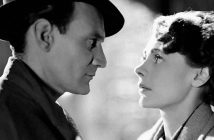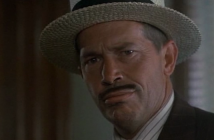
Editor’s Notes: Sing Street is currently out in limited theatrical release.
Placards should be placed at judicious intervals outside multiplexes and arthouses playing John Carney’s (Begin Again, Once) latest, Dublin-set ode to the wonders and joys of music-making, performance, and romantic love, Sing Street, warning cynics and pessimists that they will, in fact, emerge from seeing Sing Street far more likely to start a band or, if they’re feeling slightly less adventurous, listen to their favorite childhood bands than to re-embrace their cynicism or pessimism. Sing Street swells and swoons with music – here the early and mid ‘80s bands and artists that broadly fell under the New Wave and/or New Romantic movement – as a defining and redefining, an uplifting and elevating, maybe even a life-altering, force in the lives and identities of its young musicians and the vibrant, buoyant period-specific songs they write, rehearse, and perform.
Like so much in Sing Street, reality and verisimilitude often give way to fantasy and wish fulfillment . . .

And it all starts with a sixteen-year-old girl, Raphina (Lucy Boynton), who catches the eye of Sing Street’s protagonist, Conor (Ferdia Walsh-Peelo), a fifteen-year-old teen struggling with a disintegrating family at home and an oppressive environment at his new high school, a Catholic public school run by the authoritarian-minded Christian Brothers. Conor suffers the slings and arrows of his “new kid in school” status, becoming the target of the school’s resident skinhead bully. He also becomes the subject of a Christian brother’s (Don Wycherley) unwanted, possibly predatory attention. But it’s Raphina who turns his life (and his frown) upside down. A semi-permanent figure on the steps of a nearby home for wayward girls, Raphina embodies Conor’s burgeoning ideal romantic partner: She looks and sounds worldly wise (she isn’t), exuding a rebellious, anti-authoritarian attitude Conor can’t resist. She also talks about leaving Dublin and its limited economic opportunities behind for a modeling career in London.
. . . a crowd-pleasing narrative capped by a well earned, well deserved, unironic ending.
Reacting impulsively, Conor claims he’s in a band and needs a model for their upcoming video shoot. Except he’s not in a band and there’s no upcoming video shoot. Luckily for Conor, one of his new classmates, Darren (Ben Carolan), a wannabe band manager and videographer, can put it all together, beginning with another classmate, Eamon (Mark McKenna), who becomes the Lennon to Conor’s McCarthy (or the Edge to his Bono, if we’re sticking with Irish bands), co-writing increasingly sophisticated, polished pop-rock songs. Carney co-wrote the songs with Gary Clark, each one perfectly tuned to the time, place, and musical influences that Conor’s band, Sing Street, play throughout the film. The influences range from Duran Duran to The Jam, The Cure, Joe Jackson, and even Hall & Oates, partly the result of Conor’s older, stoner-mentor brother, Brendan (Jack Reynor).
Brendan imparts practically all of the musical education Conor needs. Like so much in Sing Street, reality and verisimilitude often give way to fantasy and wish fulfillment, but that’s not meant necessarily as a knock or criticism. In their purest form, musicals, even musicals where song making and performance are integrated into their respective narratives, tend to represent both the inner, unspoken desires of their central characters and a heightened, non-naturalistic realm. For Conor, the band becomes the end-all, be-all, initially to get the seemingly unobtainable girl, Raphina, but later as a means to develop his own identity, to self-actualize as a musician. Despite Raphina’s status as the object of Conor’s desire, she isn’t without agency or autonomy of her own, a credit to Carney’s empathetic approach to character and characterization. Even the bully gets a moment of his own, albeit in constricted, reductive terms (he’s bullied and abused by an alcoholic father).
Working with a non-professional cast – they were handpicked for their musical skills, not their acting backgrounds, the better to avoid the affections, mannerisms, and tics of child actors – and a tightly focused script that doesn’t forsake the telling period detail or the recognition of the social, cultural, and political realities of the time, Carney has succeeded where he failed with Begin Again, creating an indelible music drama filled with root-worthy characters, earworm-heavy pop-rock songs (“Drive It Like You Stole It,” “To Find You,” “Up,” among others), and a crowd-pleasing narrative capped by a well earned, well deserved, unironic ending.
Working with a non-professional cast – they were handpicked for their musical skills, not their acting backgrounds, the better to avoid the affections, mannerisms, and tics of child actors – and a tightly focused script that doesn’t forsake the telling period detail or the recognition of the social, cultural, and political realities of the time, Carney has succeeded where he failed with Begin Again, creating an indelible music drama filled with root-worthy characters.



